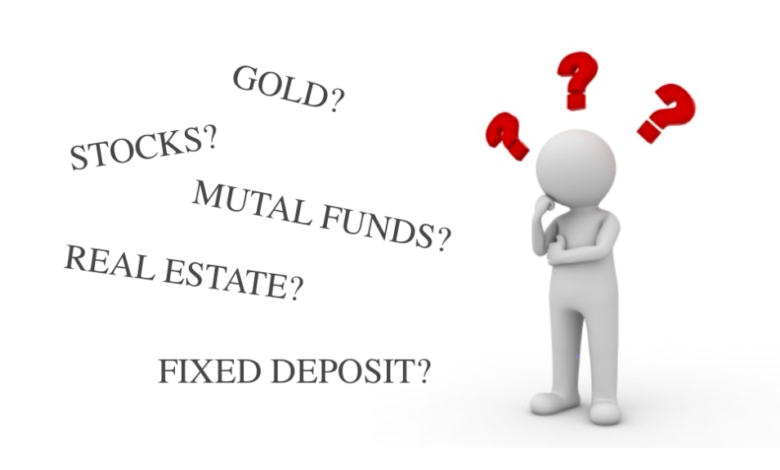
Imagine you are a twenty-something-year-old working professional, who has just started to receive a monthly stipend. Fresh out of university, you are still researching investment avenues because everyone around you ranging from colleagues to parents has told you that you must invest your money somewhere. Now the question constantly hovering in your head is, “where?”
Source – Quora
For a lot of people under the age of 35 or 40, equities seem to be a more preferred investment avenue as while risk in equity investment is considerably high, so are the returns they provide. One or two good stocks and you might just get lucky within no time. The stock market is a fast-flowing river and everyone must take a dip at the right time to enjoy a good profit. This is the mentality of a lot of young people in the country.
On the other hand, we have people over a certain age of let’s say 40, who have saved money over the years and opt for more traditional or safer avenues of investments. These could be bank deposits, provident funds, or the most popular of them all- gold.
Investment is a subjective choice. It depends on a lot of conditions. On one hand, Mr. A may prefer to receive quicker returns and is okay with taking a little risk. On the other hand, we have Mr. B who prefers assured returns, and doesn’t mind waiting for a few years to get them. We also have a Mr. C, a retired senior citizen who invests his money in stocks on an intra-day basis merely to occupy his time, and then we have Mr. D who prefers to park his money in either real estate or jewelry to receive returns in time for his retirement or the education or wedding of his children.
The point is, investment choices differ from individual to individual on the basis of the appetite for risk, the level of return expected, the time one is willing to wait for, and the purpose of the return.
Gold v. Equity: which one gives better returns?
Before the advent of paper currency, people held their assets in the form of precious metals, like gold. Gold has historically been the most precious metal, and it has been intrinsically linked with social and cultural milieu of all ages. Along with being an indicator of a person’s wealth, gold is often passed on to subsequent generations as inheritance. At present, however, investment in gold has lost its sheen because of the advent of better investment avenues, like stocks and securities.
But, gold continues to play an important role in portfolio diversification. It is also an investment which can beat inflationary trends. In the times of macroeconomic uncertainty and turbulence, investment in gold can prove to be relatively safer than other instruments.
On the other hand, you have equities, which are famous for providing quicker and higher returns as compared to gold. Investing in equities has its own benefits. Equities provide comparatively faster returns; their performance can be gauged to a certain extent by going through the fundamentals and technical analysis of the company, and some stocks even provide dividends, something that gold cannot.
Source – LinkedIn
But, one major downfall of equities is that they are sensitive to global cues. So is gold, but equities respond to global events stronger than gold does. When the Covid 19 pandemic hit us, equity markets across the globe crashed, and despite recovering as months passed, they crashed every time a new variant or strain of the virus was discovered. Stock markets across the globe crashed because of the Covid-19 crisis.
Indian stock markets fell by around 23% in March. On average, stock prices fell by around 30%-40%. Talking about gold and Covid, according to reports from the Indian Bullion and Jewellers Association Ltd, gold prices peaked at Rs 46,000 for 10 grams in the third week of April 2020. For the first fortnight of April, there was a 7% increase in the prices of gold. Returns from gold investments in April 2020 were around 11%.
Let’s fast forward to when the Omicron variant of the virus was discovered. On 26 November 2021, the BSE Sensex had its biggest daily fall in the last seven months due to fears about Omicron. Gold has historically exhibited a negative correlation during equity sell-offs and domestic gold prices increased by 1.3% on 26 November 2021.
Gold’s movement through major stock market crashes:
Source – Angel Broking
According to industry experts, gold is among the safest investment avenues, especially during times of market volatility and crisis. As such, more people are investing either in physical gold or gold-backed Exchange Traded Funds (ETFs).
Source – Angel Broking
Gold has slowly, but steadily maintained its upwards price momentum over the years, and through various stock market crashes. In the present scenario, investment in gold can be a safe alternative. Typically, investing in gold provides moderate to high returns even when other asset classes, including equities are under-performing.
Source – Moneylife Advisory
So where must you put your money?
Equity and gold both have their fair share of advantages as well as drawbacks. There is no one safe or fool-proof avenue of investment. In simple terms, it all simmers down to the risk appetite you have, the time you are willing to wait for your return, and the kind of return you are expecting.
Even equities have different levels of risk, blue chips being the safest ones to invest in. If you are looking at faster and higher returns and are willing to take medium to high risk, then equities would be a good option to consider. Whereas, if you do not want to take a lot of risk and are willing to wait for more than five years to receive a decent return, then gold is a safer option.
Please note, this is not investment advice. It is just a comparison between two investment options, among a wide variety of avenues and asset classes available to invest in.
Written by- Snehi Shah
Edited by- Jasmine Kaur Bhatia
The post Gold vs Equity: Risk and Returns appeared first on The Economic Transcript.





